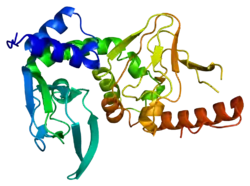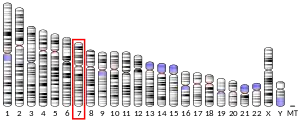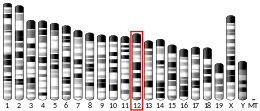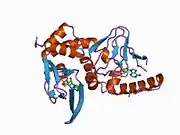PRKAR2B
cAMP-dependent protein kinase type II-beta regulatory subunit is an enzyme that in humans is encoded by the PRKAR2B gene.[5][6]
Function
cAMP is a signaling molecule important for a variety of cellular functions. cAMP exerts its effects by activating the cAMP-dependent protein kinase (PKA), which transduces the signal through phosphorylation of different target proteins. The inactive holoenzyme of PKA is a tetramer composed of two regulatory and two catalytic subunits. cAMP causes the dissociation of the inactive holoenzyme into a dimer of regulatory subunits bound to four cAMP and two free monomeric catalytic subunits. Four different regulatory subunits and three catalytic subunits of PKA have been identified in humans. The protein encoded by this gene is one of the regulatory subunits. This subunit can be phosphorylated by the activated catalytic subunit. This subunit has been shown to interact with and suppress the transcriptional activity of the cAMP responsive element binding protein 1 (CREB1) in activated T cells. Knockout studies in mice suggest that this subunit may play an important role in regulating energy balance and adiposity. The studies also suggest that this subunit may mediate the gene induction and cataleptic behavior induced by haloperidol.[6]
References
- ENSG00000284096 GRCh38: Ensembl release 89: ENSG00000005249, ENSG00000284096 - Ensembl, May 2017
- GRCm38: Ensembl release 89: ENSMUSG00000002997 - Ensembl, May 2017
- "Human PubMed Reference:". National Center for Biotechnology Information, U.S. National Library of Medicine.
- "Mouse PubMed Reference:". National Center for Biotechnology Information, U.S. National Library of Medicine.
- Solberg R, Sistonen P, Träskelin AL, Bérubé D, Simard J, Krajci P, Jahnsen T, de la Chapelle A (Sep 1992). "Mapping of the regulatory subunits RI beta and RII beta of cAMP-dependent protein kinase genes on human chromosome 7". Genomics. 14 (1): 63–9. doi:10.1016/S0888-7543(05)80284-8. PMID 1358799.
- "Entrez Gene: PRKAR2B protein kinase, cAMP-dependent, regulatory, type II, beta".
- Reinton N, Collas P, Haugen TB, Skâlhegg BS, Hansson V, Jahnsen T, Taskén K (Jul 2000). "Localization of a novel human A-kinase-anchoring protein, hAKAP220, during spermatogenesis". Developmental Biology. 223 (1): 194–204. doi:10.1006/dbio.2000.9725. PMID 10864471.
Further reading
- Harrich D, McMillan N, Munoz L, Apolloni A, Meredith L (Dec 2006). "Will diverse Tat interactions lead to novel antiretroviral drug targets?". Current Drug Targets. 7 (12): 1595–606. doi:10.2174/138945006779025338. PMID 17168834.
- Luo Z, Singh IS, Fujihira T, Erlichman J (Dec 1992). "Characterization of a minimal promoter element required for transcription of the mouse type II beta regulatory subunit (RII beta) of cAMP-dependent protein kinase". The Journal of Biological Chemistry. 267 (34): 24738–47. PMID 1332964.
- Rios RM, Celati C, Lohmann SM, Bornens M, Keryer G (May 1992). "Identification of a high affinity binding protein for the regulatory subunit RII beta of cAMP-dependent protein kinase in Golgi enriched membranes of human lymphoblasts". The EMBO Journal. 11 (5): 1723–31. doi:10.1002/j.1460-2075.1992.tb05224.x. PMC 556630. PMID 1582408.
- Tortora G, Clair T, Cho-Chung YS (Jan 1990). "An antisense oligodeoxynucleotide targeted against the type II beta regulatory subunit mRNA of protein kinase inhibits cAMP-induced differentiation in HL-60 leukemia cells without affecting phorbol ester effects". Proceedings of the National Academy of Sciences of the United States of America. 87 (2): 705–8. doi:10.1073/pnas.87.2.705. PMC 53334. PMID 1689049.
- Hofmann B, Nishanian P, Baldwin RL, Insixiengmay P, Nel A, Fahey JL (Dec 1990). "HIV inhibits the early steps of lymphocyte activation, including initiation of inositol phospholipid metabolism". Journal of Immunology. 145 (11): 3699–705. PMID 1978848.
- Levy FO, Oyen O, Sandberg M, Taskén K, Eskild W, Hansson V, Jahnsen T (Dec 1988). "Molecular cloning, complementary deoxyribonucleic acid structure and predicted full-length amino acid sequence of the hormone-inducible regulatory subunit of 3'-5'-cyclic adenosine monophosphate-dependent protein kinase from human testis". Molecular Endocrinology. 2 (12): 1364–73. doi:10.1210/mend-2-12-1364. PMID 2851102.
- Scambler P, Oyen O, Wainwright B, Farrall M, Law HY, Estivill X, Sandberg M, Williamson R, Jahnsen T (Nov 1987). "Exclusion of catalytic and regulatory subunits of cAMP-dependent protein kinase as candidate genes for the defect causing cystic fibrosis". American Journal of Human Genetics. 41 (5): 925–32. PMC 1684338. PMID 3479018.
- Wainwright B, Lench N, Davies K, Scambler P, Kruyer H, Williamson R, Jahnsen T, Farrall M (1988). "A human regulatory subunit of type II cAMP-dependent protein kinase localized by its linkage relationship to several cloned chromosome 7q markers". Cytogenetics and Cell Genetics. 45 (3–4): 237–9. doi:10.1159/000132461. PMID 3691190.
- Budillon A, Cereseto A, Kondrashin A, Nesterova M, Merlo G, Clair T, Cho-Chung YS (Nov 1995). "Point mutation of the autophosphorylation site or in the nuclear location signal causes protein kinase A RII beta regulatory subunit to lose its ability to revert transformed fibroblasts". Proceedings of the National Academy of Sciences of the United States of America. 92 (23): 10634–8. doi:10.1073/pnas.92.23.10634. PMC 40666. PMID 7479855.
- Hofmann B, Nishanian P, Nguyen T, Insixiengmay P, Fahey JL (Jul 1993). "Human immunodeficiency virus proteins induce the inhibitory cAMP/protein kinase A pathway in normal lymphocytes". Proceedings of the National Academy of Sciences of the United States of America. 90 (14): 6676–80. doi:10.1073/pnas.90.14.6676. PMC 46995. PMID 7688126.
- Berg JP, Ree AH, Sandvik JA, Taskén K, Landmark BF, Torjesen PA, Haug E (Dec 1994). "1,25-dihydroxyvitamin D3 alters the effect of cAMP in thyroid cells by increasing the regulatory subunit type II beta of the cAMP-dependent protein kinase". The Journal of Biological Chemistry. 269 (51): 32233–8. PMID 7798223.
- Li Y, Rubin CS (Jan 1995). "Mutagenesis of the regulatory subunit (RII beta) of cAMP-dependent protein kinase II beta reveals hydrophobic amino acids that are essential for RII beta dimerization and/or anchoring RII beta to the cytoskeleton". The Journal of Biological Chemistry. 270 (4): 1935–44. doi:10.1074/jbc.270.4.1935. PMID 7829531.
- Hofmann B, Nishanian P, Fan J, Nguyen T, Fahey JL (Jul 1994). "HIV Gag p17 protein impairs proliferation of normal lymphocytes in vitro". AIDS. 8 (7): 1016–7. doi:10.1097/00002030-199407000-00025. PMID 7946090.
- Glantz SB, Li Y, Rubin CS (Jun 1993). "Characterization of distinct tethering and intracellular targeting domains in AKAP75, a protein that links cAMP-dependent protein kinase II beta to the cytoskeleton". The Journal of Biological Chemistry. 268 (17): 12796–804. PMID 8509414.
- Keryer G, Luo Z, Cavadore JC, Erlichman J, Bornens M (Jun 1993). "Phosphorylation of the regulatory subunit of type II beta cAMP-dependent protein kinase by cyclin B/p34cdc2 kinase impairs its binding to microtubule-associated protein 2". Proceedings of the National Academy of Sciences of the United States of America. 90 (12): 5418–22. doi:10.1073/pnas.90.12.5418. PMC 46731. PMID 8516283.
- Swingler S, Gallay P, Camaur D, Song J, Abo A, Trono D (Jun 1997). "The Nef protein of human immunodeficiency virus type 1 enhances serine phosphorylation of the viral matrix". Journal of Virology. 71 (6): 4372–7. doi:10.1128/JVI.71.6.4372-4377.1997. PMC 191654. PMID 9151826.
- Chen P, Mayne M, Power C, Nath A (Sep 1997). "The Tat protein of HIV-1 induces tumor necrosis factor-alpha production. Implications for HIV-1-associated neurological diseases". The Journal of Biological Chemistry. 272 (36): 22385–8. doi:10.1074/jbc.272.36.22385. PMID 9278385.
- Huang LJ, Durick K, Weiner JA, Chun J, Taylor SS (Oct 1997). "D-AKAP2, a novel protein kinase A anchoring protein with a putative RGS domain". Proceedings of the National Academy of Sciences of the United States of America. 94 (21): 11184–9. doi:10.1073/pnas.94.21.11184. PMC 23409. PMID 9326583.
- Zidovetzki R, Wang JL, Chen P, Jeyaseelan R, Hofman F (Jul 1998). "Human immunodeficiency virus Tat protein induces interleukin 6 mRNA expression in human brain endothelial cells via protein kinase C- and cAMP-dependent protein kinase pathways". AIDS Research and Human Retroviruses. 14 (10): 825–33. doi:10.1089/aid.1998.14.825. PMID 9671211.






